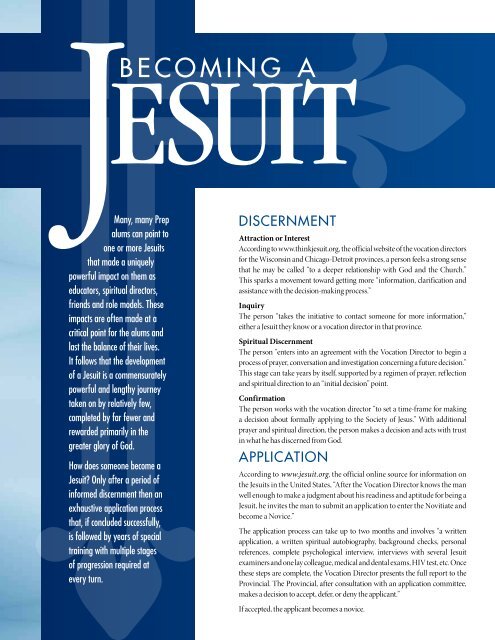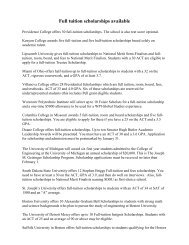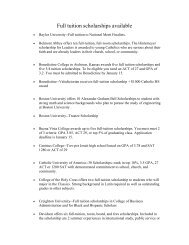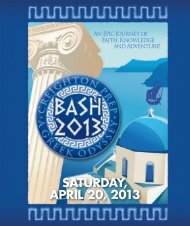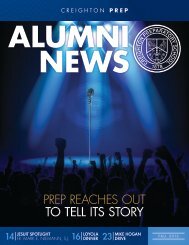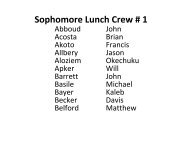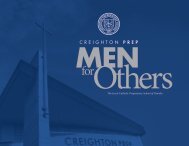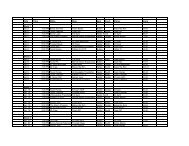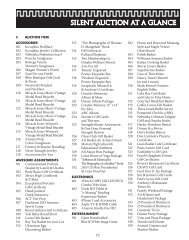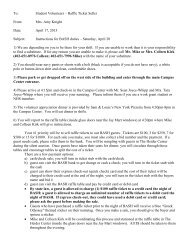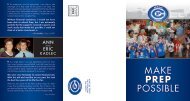View the Summer 2012 Alumni News now. - Creighton Prep ...
View the Summer 2012 Alumni News now. - Creighton Prep ...
View the Summer 2012 Alumni News now. - Creighton Prep ...
You also want an ePaper? Increase the reach of your titles
YUMPU automatically turns print PDFs into web optimized ePapers that Google loves.
ESUIT<br />
BEcoMinG A<br />
Many, many <strong>Prep</strong><br />
alums can point to<br />
one or more Jesuits<br />
that made a uniquely<br />
powerful impact on <strong>the</strong>m as<br />
educators, spiritual directors,<br />
friends and role models. These<br />
impacts are often made at a<br />
critical point for <strong>the</strong> alums and<br />
last <strong>the</strong> balance of <strong>the</strong>ir lives.<br />
It follows that <strong>the</strong> development<br />
of a Jesuit is a commensurately<br />
powerful and lengthy journey<br />
taken on by relatively few,<br />
completed by far fewer and<br />
rewarded primarily in <strong>the</strong><br />
greater glory of God.<br />
How does someone become a<br />
Jesuit? Only after a period of<br />
informed discernment <strong>the</strong>n an<br />
exhaustive application process<br />
that, if concluded successfully,<br />
is followed by years of special<br />
training with multiple stages<br />
of progression required at<br />
every turn.<br />
DiScERnMEnT<br />
Attraction or Interest<br />
According to www.thinkjesuit.org, <strong>the</strong> official website of <strong>the</strong> vocation directors<br />
for <strong>the</strong> Wisconsin and Chicago-Detroit provinces, a person feels a strong sense<br />
that he may be called “to a deeper relationship with God and <strong>the</strong> Church.”<br />
This sparks a movement toward getting more “information, clarification and<br />
assistance with <strong>the</strong> decision-making process.”<br />
Inquiry<br />
The person “takes <strong>the</strong> initiative to contact someone for more information,”<br />
ei<strong>the</strong>r a Jesuit <strong>the</strong>y k<strong>now</strong> or a vocation director in that province.<br />
Spiritual Discernment<br />
The person “enters into an agreement with <strong>the</strong> Vocation Director to begin a<br />
process of prayer, conversation and investigation concerning a future decision.”<br />
This stage can take years by itself, supported by a regimen of prayer, reflection<br />
and spiritual direction to an “initial decision” point.<br />
Confirmation<br />
The person works with <strong>the</strong> vocation director “to set a time-frame for making<br />
a decision about formally applying to <strong>the</strong> Society of Jesus.” With additional<br />
prayer and spiritual direction, <strong>the</strong> person makes a decision and acts with trust<br />
in what he has discerned from God.<br />
APPlicATion<br />
According to www.jesuit.org, <strong>the</strong> official online source for information on<br />
<strong>the</strong> Jesuits in <strong>the</strong> United States, “After <strong>the</strong> Vocation Director k<strong>now</strong>s <strong>the</strong> man<br />
well enough to make a judgment about his readiness and aptitude for being a<br />
Jesuit, he invites <strong>the</strong> man to submit an application to enter <strong>the</strong> Novitiate and<br />
become a Novice.”<br />
The application process can take up to two months and involves “a written<br />
application, a written spiritual autobiography, background checks, personal<br />
references, complete psychological interview, interviews with several Jesuit<br />
examiners and one lay colleague, medical and dental exams, HIV test, etc. Once<br />
<strong>the</strong>se steps are complete, <strong>the</strong> Vocation Director presents <strong>the</strong> full report to <strong>the</strong><br />
Provincial. The Provincial, after consultation with an application committee,<br />
makes a decision to accept, defer, or deny <strong>the</strong> applicant.”<br />
If accepted, <strong>the</strong> applicant becomes a novice.<br />
TRAininG (source: www.thinkjesuit.org)<br />
Novitiate and First Vows<br />
For two years, <strong>the</strong> novice lives in a community, teaches catechism,<br />
works with <strong>the</strong> poor, goes on pilgrimages, studies <strong>the</strong> writings of<br />
St. Ignatius Loyola and makes a 30-day retreat based on The<br />
Spiritual Exercises, all to assist him in confirming his calling to <strong>the</strong><br />
Jesuit order. Then he “applies for his first vows of poverty, chastity<br />
and obedience.”<br />
After first vows are pronounced, “he becomes a Jesuit scholastic<br />
(continuing to prepare for ministerial priesthood) or a Jesuit bro<strong>the</strong>r.”<br />
First Studies<br />
For <strong>the</strong> ensuing two or three years, <strong>the</strong> Jesuit scholastic or bro<strong>the</strong>r<br />
uses intellectual pursuits to fur<strong>the</strong>r understand God’s work, often<br />
completing an advanced degree inside <strong>the</strong> Jesuit First Studies<br />
programs at St. Louis University, Loyola University of Chicago or<br />
Fordham University.<br />
Regency<br />
The Jesuit bro<strong>the</strong>r or scholastic is <strong>the</strong>n “missioned to an apostolic<br />
assignment to serve for several years” to deepen his commitment<br />
to <strong>the</strong> Order and develop his skills. These assignments can involve<br />
teaching at a high school or university or working in a parish.<br />
For example, Mr. Vincent Strand, S.J. is currently in regency at<br />
<strong>Creighton</strong> <strong>Prep</strong>, teaching philosophy and <strong>the</strong>ology after completing<br />
his master’s degree in philosophy at Fordham in 2010.<br />
Theology and Ordination<br />
In preparation for ordination, Jesuit scholastics return to school,<br />
typically for three years, at a Jesuit <strong>the</strong>ologate to earn a Master of<br />
Divinity degree “and possibly ano<strong>the</strong>r degree.” In <strong>the</strong> United States,<br />
this means studies at ei<strong>the</strong>r <strong>the</strong> Boston College School of Theology<br />
and Ministry in Brighton, Massachusetts or The Jesuit School of<br />
Theology of Santa Clara University in Berkeley, California. Jesuit<br />
bro<strong>the</strong>rs may, during this time, study <strong>the</strong>ology for a shorter period<br />
in order to prepare for ministerial work.<br />
Tertianship and Final Vows<br />
Tertianship “refers to <strong>the</strong> period of preparation for final vows in <strong>the</strong><br />
Society of Jesus.” Typically three to five years after <strong>the</strong> advanced<br />
studies mentioned above, <strong>the</strong> Jesuit Superior or <strong>the</strong> area provincial<br />
invites a Jesuit to a 6-12 month period in which he works with a<br />
spiritual director, re-reads <strong>the</strong> “foundational documents” of <strong>the</strong><br />
Society, makes a second 30-day retreat based on <strong>the</strong> Spiritual<br />
Exercises and works in various assignments, often with <strong>the</strong> poor.<br />
Fr. Merkel will begin his tertianship in Melbourne, Australia in<br />
January 2013.<br />
“After <strong>the</strong> tertianship period, <strong>the</strong> Jesuit is invited to pronounce<br />
final vows. These vows include a renewal of his vows of poverty,<br />
chastity, and obedience, as well as o<strong>the</strong>r promises (e.g. not to seek<br />
advancement or authority in <strong>the</strong> Society of Jesus). Most will<br />
pronounce a special vow of obedience to <strong>the</strong> Pope regarding<br />
availability for missions.”<br />
The training and education of a Jesuit can easily take 10 or more<br />
years and cost an estimated $550,000-$650,000.<br />
fAcTS AnD fiGURES:<br />
THE SociETY of JESUS<br />
Around <strong>the</strong> World (source: www.jesuit.org)<br />
The Society of Jesus is headquartered in Rome at <strong>the</strong> Jesuit Curia,<br />
where <strong>the</strong> current Superior General, Fr. Adolfo Nicolás, S.J.,<br />
and his staff oversee nine regions worldwide—Central/Eastern<br />
Europe, Western Europe, South Europe, Africa, <strong>the</strong> United<br />
States, North Latin America, South Latin America, Asia Pacific—<br />
“with o<strong>the</strong>r Assistancies and Jesuit Conferences representing<br />
each region.”<br />
• As of January 1, <strong>2012</strong>, <strong>the</strong> total number of Jesuits worldwide<br />
was 17,637, representing 12,526 priests, 1,470 bro<strong>the</strong>rs,<br />
2,896 scholastics and 745 novices.<br />
• At <strong>the</strong>ir peak in 1965, <strong>the</strong>re were some 36,000 in <strong>the</strong> Society.<br />
• There are approximately 2,800 Jesuits in <strong>the</strong> United States.<br />
In North America<br />
The Society of Jesus is organized into 11 provinces or geographic<br />
regions, each headed by a provincial superior appointed<br />
by <strong>the</strong> Superior General in Rome. They are: New England,<br />
New york, Maryland, Chicago-detroit, Wisconsin, Missouri,<br />
New Orleans, California and Oregon plus French Canada and<br />
English Canada.<br />
In <strong>the</strong> Wisconsin Province (source: www.jesuitpartners.org)<br />
Fr. Tom Lawler, S.J. is <strong>the</strong> current provincial of <strong>the</strong> seven-state<br />
Wisconsin Province and he and his Milwaukee-area staff direct<br />
a number of educational institutions, Native American missions,<br />
parishes, and retreat houses and spirituality centers for <strong>the</strong><br />
Society of Jesus. In Nebraska, this includes <strong>Creighton</strong> <strong>Prep</strong>,<br />
<strong>Creighton</strong> University and <strong>the</strong> Jesuit Academy.<br />
There are 254 members of <strong>the</strong> Society of Jesus in <strong>the</strong> Province,<br />
including:<br />
• 214 Jesuit priests (ordained)<br />
• 26 Jesuit scholastics<br />
• 10 Jesuit bro<strong>the</strong>rs<br />
• Four studying at <strong>the</strong> novitiate<br />
The youngest of <strong>the</strong>se is 22 and <strong>the</strong> oldest is 95, with <strong>the</strong> average<br />
age being 66.<br />
Jesuits in <strong>the</strong> Wisconsin Province work in numerous educational,<br />
ministerial and pastoral roles, speak a combined 24 languages—<br />
including German, French, Italian, Spanish, Russian, Greek,<br />
Swahili, Portuguese, Hungarian, Lakota and Korean—and hold<br />
undergraduate and advanced degrees in a variety of fields<br />
such as:<br />
• Business Administration<br />
• Chemical Engineering<br />
• Classics<br />
• Economics<br />
• History<br />
• Journalism<br />
• Law<br />
• Ma<strong>the</strong>matics<br />
• Music<br />
• Political Science<br />
• Psychiatry<br />
• Scripture<br />
• Organic Chemistry • Social Work<br />
• Philosophy • Theatre Arts<br />
• Physics<br />
• Zoology<br />
If you think you may have a calling to join<br />
this special bro<strong>the</strong>rhood, visit thinkjesuit.org for<br />
more information or contact Vocation Director<br />
Fr. Paul Coelho, S.J. at 414-727-5231 or<br />
vocations@jesuitwisprov.org.


